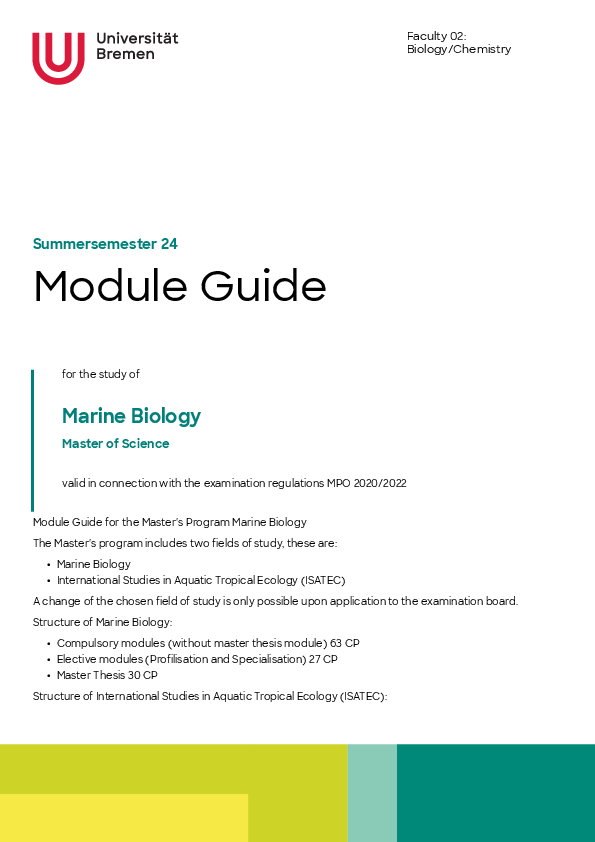Teaching
First Term - Modules and Course Structure
The 1st term sets the scene for a successful qualification and academic career in Marine Biology or ISATEC by building up a sound theoretical background and introducing important concepts of Marine Biology and Biological Oceanography as well as the essential fundamentals of the neighbouring disciplines Marine Geosciences, Physical Oceanography, Marine Chemistry, and Marine Biogeochemistry. In this multidisciplinary approach, students will learn the importance of cross-disciplinary co-operation and exchange for successful state-of-the-art marine research. Students will participate in a field practical on Marine Fauna and Flora on the Island of Helgoland. In addition, the first term offers the opportunity to improve personal capabilities and skills, in particular with regard to scientific communication and writing. The first ISATEC-specific course will introduce students to Tropical Coastal Ecosystems.
Downloads
Master's Program Marine Biology for Summer Term 2024
File name: MT_Module_Guide_for_the_Master_s_Program_Marine_Biology_29221_3_en-1.pdfLast update: 08.04.2024
Second Term - Modules and Course Structure
The core of the Marine Biology and ISATEC curriculum taught in the 2nd term consists of a series of elective practical classes. They allow students to focus on topics of their own interest and, at the same time, learn state-of-the-art methods in differerent leading research teams at the university and the associated research institutions. The wide selection of courses includes i.a. Global Change Ecophysiology; Ecological Modelling: Populations, Climate, Conservation; Rocky Shore Ecology on Helgoland; Marine Biodiversity and Food Webs; Marine Molecular Biology and Fisheries Biology or Aquaculture Practical. ISATEC students will take a course dealing with Coastal Planning, Management and Governance, also including an introduction to Law of the Sea. Finally, Marine Biology students will have the opportunity to apply their acquired knowledge on different marine ecosystems and to widen their scope on marine biodiversity during other field trips for instance to the Mediterranean Sea or Brittany in France. Occasionally, we also organize dedicated training and research cruises onboard research vessels ("Floating Universities") or offer participation in regular research expeditions as student co-worker. The high proportion of practical classes offers hands-on training in different fields of marine biology.
Third and Fourth Term - Modules and Course Structure
The third semester is reserved for the Student Research Project (SRP). Students will be integrated in different research teams and work on burning issues of current marine research, providing them with first-hand experience of scientific work and proficiency in state-of-the-art methodologies. During the SRP, students work on self-chosen research objectives, embedded in and supervised by research teams at Bremen University or at one of the associated research institutions. They apply acquired skills, learn state-of-the-art methods, and practice self-dependent project work for the master thesis in the fourth term.
ISATEC students will conduct their Student Research Project abroad on a tropical topic.
Towards the end of the third term, students will develop and defend a proposal for their own research project, which may directly lead to the master thesis in the 4th and final term. The thesis can be prepared either at a marine biological department of the University of Bremen or at one of the associated marine research institutions.


